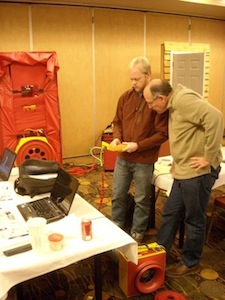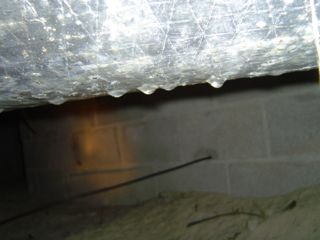A Home Energy Rater Class Is Just the Beginning

So, you’re about to take a class to become a home energy rater or building analyst so you can go out and do energy audits. Maybe you’ve already taken a class and are out there trying to make a living at it now. You may be aware of this already, but here’s a little secret: What you learned in your 5 or 8 day class was just the tip of the iceberg. If you’re new at this, you’ve got a lot more learning left to do than you’ve already done.
This shouldn’t be too much of a surprise, though. It’s a technical field that requires a lot of knowledge, skill, and experience. You have to understand pressure testing, energy modeling, HERS or BPI standards (or both), and building science. You get a dose of all those things in your class, but it’s not until you get out and start trying to use that knowledge in the real world that it becomes real.
That’s also when most new energy auditors realize how much they still need to learn. For example, you saw in class how easily your instructor ran the duct leakage test and got results. You should have also had a chance to operate the equipment yourself and demonstrate that you understood the basic principles.
But then you get out and attempt your first test and try to find the duct leakage outside the building envelope.
“Wait. I thought I was supposed to turn the fan up until the ducts are at 25 Pascals. Why is this number as high as the other test? Maybe I set the manometer for the wrong device. Is Config set right? This doesn’t make any sense.”
That’s about the time I get a call from our new raters. Yet that, too, is still early in the process.
Once you’re proficient at running the pressure tests, using your energy modeling software, and doing audits according to the standards, a whole new level of learning kicks in. Maybe a customer accuses you of breaking the seal on their double-pane windows when you depressurized the house. Or you want to know if house-wrap works for sheathing the attic-side of kneewalls. Or you realize how poorly you understand ventilation. Or you see ducts sweating in a crawl space and want to understand condensation better.
proficient at running the pressure tests, using your energy modeling software, and doing audits according to the standards, a whole new level of learning kicks in. Maybe a customer accuses you of breaking the seal on their double-pane windows when you depressurized the house. Or you want to know if house-wrap works for sheathing the attic-side of kneewalls. Or you realize how poorly you understand ventilation. Or you see ducts sweating in a crawl space and want to understand condensation better.
The real world is much more complex than any classroom, you see. A HERS rater class can take you only so far, but then you’ve got to dedicate yourself to learning as much as you possibly can. Here are a few tips for new energy auditors:
- Join Home Energy Pros and the RESNET BPI group on LinkedIn. Both are tremendous resources and allow you to ask questions, interact with your peers, or just lurk and learn.
- Read Green Building Advisor regularly, especially Musings of an Energy Nerd by Martin Holladay. Great resourse! This is also an active community, and you should sign up for their free membership to contribrute or their pro membership to get all the benefits.
- Read The Journal of Light Construction and Remodeling Magazine‘s websites. They’re similar to GBA.
- Subscribe to the Energy Vanguard Blog. Type your email address into the box at the top right of this page. (But you’re already a subscriber, right?)
- Subcribe to Home Energy Magazine. It’s probably the best print resource for home energy pros and they have a great website, too.
- Go to the RESNET or Affordable Comfort conferences. Amazing learning and networking happens there.
- Read everything you can from Building Science Corporation’s website. They make a lot of their publications available for free. You can also buy most of the best building science books available through their bookstore.
- Read the manuals for all of your equipment. There’s a lot of good info in there.
- Learn the ACCA protocols for HVAC design. It’s important stuff.
- Buy and study the ASHRAE standards we refer to all the time. The main ones would be 62.2 for ventilation and 55 for comfort.
- Get as much hands-on practice as you can. This will certainly include your house and your friends’ and family’s homes, but you can also offer free audits or other services for practice. Of course, you can also volunteer on charitable projects like Habitat for Humanity.
- Teach. If you get the opportunity to teach others what you know, you’ll find it invaluable in helping to cement what you already know and go deeper into the details. You can never prepare well enough to answer every question, but make sure you remember the ones you couldn’t answer and do your research afterwards. Teachers often say if you want to really understand something, teach it. In our classes, we apply that in a different form: The one who’s doing the most talking is doing the most learning.
- Write a blog. Since I started the Energy Vanguard Blog two years ago, I’ve had to do a lot of learning. Sometimes I write without looking up other information, but usually I have to go to other sources to supplement what I already know. With some articles, the real learning starts after it’s published and the comments start coming in.
This is, of course, not an exhaustive list, so I’d be interested in hearing what other ways of learning you’ve found after getting out of your HERS or BPI classes. Please comment below!
Once you get into this field as a home energy pro, you’ll find the rabbit hole goes much deeper than you ever thought possible. Keep learning and maybe someday you’ll get invited to Building Science Summer Camp.
This Post Has 10 Comments
Comments are closed.

Allison,
Allison,
I hope, after 30 years, Home Energy Pros, will finally learn how to make a living without Tax Subsidies, Rate Payer Tariffs, and the other peoples money?
How about a course in economics?
Thanks and keep em coming,
Pj
It is true, the learning does
It is true, the learning does not begin until you get out in the field. Kind of like architecture school, they give you enough education to get started, the rest is learned on the job.
Definitely true. You leave
Definitely true. You leave the class all revved up thinking you know everything until you get out on a job site all by yourself, look at the equipment, and think, what the hell do I do with all this stuff? Reminds me of a friend who went skydiving – they drilled them in the sequence for pulling your chute by jumping off a short ladder over and over again until complete boredom set in and they were convince that they knew how to do it. Then, when they jumped out of the plane, it was “Oh @#%$^, what do I do now?” Our industry isn’t quite as dangerous, but equally confusing when you’re on your own.
pj: I don
pj: I don’t think anyone wants a course in economics from me, but I’ll give you my favorite quote from an economist:
Anyone who believes exponential growth can go on forever in a finite world is either a madman or an economist.
~ Kenneth Boulding
Josh: Yep, you get enough to get started and the rest is up to you. Like many things, you get out of it what you put into it.
Green Curmudgeon: I like the skydiving metaphor! I’ll have to use that in or next class.
I also like Home Energy
I also like Home Energy Magazine. Being an insulation contractor teaches you all kinds of stuff too, but it’s not really practical for raters! Thanks for the good tips, I signed up for the Home Energy Pros site and Linked In group!
Alison,
Alison,
It would seem economics is what is missing from the proposed studies. There was once a concept called “capitalism”. An idea that goods and services would naturally flow to the most productive use.
It seems Home Energy “Pros” think like socialists where the state directs the resources.They like the idea of “smart” bureaucrats making choices for us, telling us what to do,subsidizing some products, not others, and picking the winners.
Why do HEP’s know better than me, what is best for me? Why should you use my money to help buy my neighbors air sealing?
I hope someday the HP folks can live, prosper, stand on their own two feet, and stop begging.
The communist system failed for a reason.
Thanks,
Pj
PJ,
PJ,
Your whole anti-government shtick is getting really old. We get it, you’re a capitalist.
Can we move on now?
PJ: Not only is your rhetoric
PJ: Not only is your rhetoric agonizing to read, it’s even more troublesome that you offer a multitude of problems and zero solutions. If you do not have something beneficial to say, please don’t say it.
/end rant
I also wanted to say that if you get the opportunity, teach. If you can effectively teach someone something you just learned, then you have a good handle on the subject. Also when teaching,students will ask questions that you do not know the answer to. This will also expand your knowledge in the search for answers for your students, because in most cases, its out there, you just have to find it.
Another great publication you
Another great publication you may have just missed or its a given is Residential energy By John Krigger and you are so right taking a class and getting certified is just a start I have all the IECC energy code certifiactions as well as resnet
plus 20 years of custom home building and I,m not talkin about these crakerjack boxes I see in these monopoly developements ..as far as duct blast testing were does the blue refernce hose go… Just kidding!!
Nate A.:
Nate A.: How in the world did I forget Home Energy Magazine?! I’ve added to the list above, so thanks for the reminder.
Andrew: Yes, absolutely teaching is a great way to learn. I’ve added it to the list above, too. Blogging is another way to do that and another surprising omission that’s now in the list.
Mark C.: Residential Energy by Krigger & Dorsi is a great resource! I think most, if not all, HERS rater classes use it as a textbook, but reading it over again more thoroughly after the class helps a lot, too.